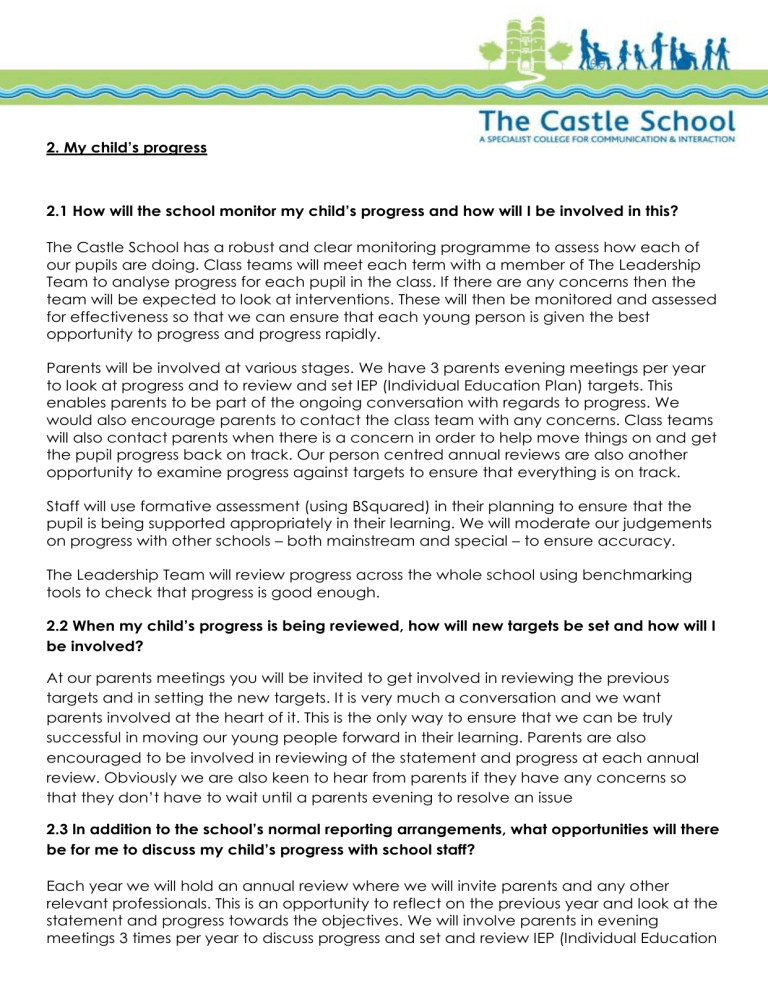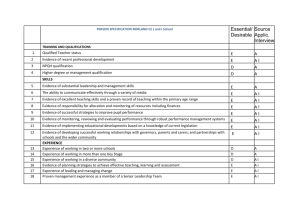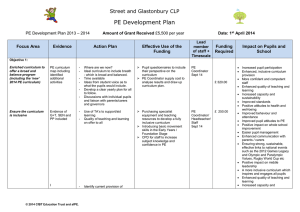2. My child's progress 2.1 How will the school monitor my child's

2. My child’s progress
2.1 How will the school monitor my child’s progress and how will I be involved in this?
The Castle School has a robust and clear monitoring programme to assess how each of our pupils are doing. Class teams will meet each term with a member of The Leadership
Team to analyse progress for each pupil in the class. If there are any concerns then the team will be expected to look at interventions. These will then be monitored and assessed for effectiveness so that we can ensure that each young person is given the best opportunity to progress and progress rapidly.
Parents will be involved at various stages. We have 3 parents evening meetings per year to look at progress and to review and set IEP (Individual Education Plan) targets. This enables parents to be part of the ongoing conversation with regards to progress. We would also encourage parents to contact the class team with any concerns. Class teams will also contact parents when there is a concern in order to help move things on and get the pupil progress back on track. Our person centred annual reviews are also another opportunity to examine progress against targets to ensure that everything is on track.
Staff will use formative assessment (using BSquared) in their planning to ensure that the pupil is being supported appropriately in their learning. We will moderate our judgements on progress with other schools – both mainstream and special – to ensure accuracy.
The Leadership Team will review progress across the whole school using benchmarking tools to check that progress is good enough.
2.2 When my child’s progress is being reviewed, how will new targets be set and how will I be involved?
At our parents meetings you will be invited to get involved in reviewing the previous targets and in setting the new targets. It is very much a conversation and we want parents involved at the heart of it. This is the only way to ensure that we can be truly successful in moving our young people forward in their learning. Parents are also encouraged to be involved in reviewing of the statement and progress at each annual review. Obviously we are also keen to hear from parents if they have any concerns so that they don’t have to wait until a parents evening to resolve an issue
2.3 ln addition to the school’s normal reporting arrangements, what opportunities will there be for me to discuss my child’s progress with school staff?
Each year we will hold an annual review where we will invite parents and any other relevant professionals. This is an opportunity to reflect on the previous year and look at the statement and progress towards the objectives. We will involve parents in evening meetings 3 times per year to discuss progress and set and review IEP (Individual Education
Plan) targets. We also encourage parents to phone to chat or make appointments with teachers and class teams whenever needed to make sure that we are doing everything we can to support your child. Each child has a home contact book which is another form of communication between home and school. Parents will also receive a comprehensive end-of-year report for their child.
2.4 What arrangements does the school have for regular home to school contact?
Each pupil will have a home-school diary which is the main mode of contact between school and parents. We find this I usually a positive and effective method. However, some parents may wish from time to time to have a bit more contact and we are open to doing things differently to help ensure that everyone is well informed and aware of what is going on. This could involve phone calls or additional meetings when needed. We believe that communication is essential and would welcome parents contacting the school in order to ensure that this happens appropriately.
2.5 How can I help support my child’s learning?
We strongly believe that we need to work in partnership with parents to ensure that the young person has the utmost opportunity for success. As we have very individualised programmes the teacher can advise the parents how they might help to progress their learning at home whether it be reading, maths or independence skills. Equally it is extremely useful when parents give us advice from the home to help implement progress improvements in school. As I have said, it is all about partnership and working together for the benefit of the young person.
We also have sessions run for parents on certain aspects of learning and they are advertised throughout the year on the school website and in reception.
2.6 Does the school offer any help for parents / carers to enable them to support their child’s learning, eg. training or learning events?
We have a very pro-active and highly skilled Pastoral Support Team. The team can work with families to help support various aspects of development including behaviour, anxiety, bereavement and learning. We also have a specialist School Autism Support Worker who can offer advice on a variety of issues including eating, bedtime routines, sleeping issues, haircuts, visual symbol support and general advice. In addition we have many coffee mornings run by the team for parents throughout the year to enable parents to discuss concerns and get support in a non-threatening and safe environment. In addition we run training programmes on many areas including ADHD, as well as events for parents and families to attend with support.
2.7 How will my child’s views be sought about the help they are getting and the progress they are making?
Even from a very young age we will seek the views of our young people. We believe it is essential that they are all involved in their own education. This will be done in a variety of ways depending on their preferred mode of communication. We will ensure that we get views of all our young people for annual reviews and older pupils will also be encouraged to attend and even present their own feelings and ideas.
Each day pupils will be involved in the planning of lessons and the planning of their own learning, particularly in regard to their IEP targets so that they are fully aware of what they need to do to move on to the next level of learning.
2.8 What accredited and non-accredited courses do you offer?
We are very keen on ensuring that our young people leave our school with a good array of qualifications. A list of courses that our young people can follow are as follows:
GCSE Maths
Entry Level
Arts Award
ASDAN
LAMDA
Duke of Edinburgh
Sports Leaders
We also will run bespoke timetables for certain qualifications that suit the needs and skills of particular students
2.9 How does the school assess the overall effectiveness of its provision and how can parents / carers and young people take part in this evaluation?
We will assess the effectiveness of provision through the analysis of our pupils’ progress.
Class Team: The class team, led by the teacher, will use formative assessment on a daily basis to assess where each child is in terms of their learning and their progress towards the next level. The teacher will record progress onto the school system so that it can be analysed. Staff will use pupil-centred approaches to ensure that they are involved in their learning and progress as is appropriate. Parents will be involved at our 3 times per year parents meetings.
Pupil Progress Meetings: These meetings take place 6 times per year and are led by a member of the Leadership Team. At the meetings the class team explore with the
Leadership Member the progress that each pupil is making in the class. If there are any concerns or issues then the class team will look at appropriate interventions that can be used. Once an intervention is implemented it will be monitored closely and evaluated at subsequent Pupil Progress Meetings.
School Progress Analysis: The Leadership Team will analyse progress of all pupils throughout the year and report to governors at the Curriculum and Pupil Committee 3 times per year. Governors will ensure that there is rigour and will challenge anything that they have a concern about. Leadership will also carry out a final year analysis and report this to governors. Targets will be set up each Autumn for class teams to work towards.








